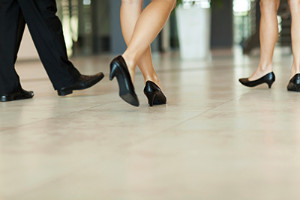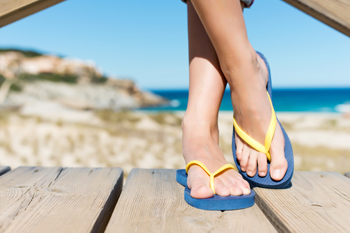
 Peripheral neuropathy is a condition that impacts the nervous system, often causing complications with the feet. If the nerves in your feet become damaged, they are no longer able to regulate your body temperature, or signal pain as they normally would. Those afflicted with this condition relay experiencing tingling sensations, or numbness in their feet. Neuropathy can be common among diabetic patients, as they are more prone to having complications with their feet. This can be dangerous if wounds go undetected due to the lack of feeling in the feet, as it’s likely an infection may then form. If diagnosed with this condition, medication may be prescribed to help ease the common symptoms. Having a healthy diet, keeping your muscles active and strong, and regularly getting massages or acupuncture may also be helpful in relieving some of the symptoms. For a proper diagnosis and an advised treatment plan, it is suggested that you speak with a podiatrist for professional care.
Peripheral neuropathy is a condition that impacts the nervous system, often causing complications with the feet. If the nerves in your feet become damaged, they are no longer able to regulate your body temperature, or signal pain as they normally would. Those afflicted with this condition relay experiencing tingling sensations, or numbness in their feet. Neuropathy can be common among diabetic patients, as they are more prone to having complications with their feet. This can be dangerous if wounds go undetected due to the lack of feeling in the feet, as it’s likely an infection may then form. If diagnosed with this condition, medication may be prescribed to help ease the common symptoms. Having a healthy diet, keeping your muscles active and strong, and regularly getting massages or acupuncture may also be helpful in relieving some of the symptoms. For a proper diagnosis and an advised treatment plan, it is suggested that you speak with a podiatrist for professional care.
Neuropathy
Neuropathy can be a potentially serious condition, especially if it is left undiagnosed. If you have any concerns that you may be experiencing nerve loss in your feet, consult with the podiatrists from The Foot & Ankle Center of New Jersey. Our doctors will assess your condition and provide you with quality foot and ankle treatment for neuropathy.
What Is Neuropathy?
Neuropathy is a condition that leads to damage to the nerves in the body. Peripheral neuropathy, or neuropathy that affects your peripheral nervous system, usually occurs in the feet. Neuropathy can be triggered by a number of different causes. Such causes include diabetes, infections, cancers, disorders, and toxic substances.
Symptoms of Neuropathy Include:
Those with diabetes are at serious risk due to being unable to feel an ulcer on their feet. Diabetics usually also suffer from poor blood circulation. This can lead to the wound not healing, infections occurring, and the limb may have to be amputated.
Treatment
To treat neuropathy in the foot, podiatrists will first diagnose the cause of the neuropathy. Figuring out the underlying cause of the neuropathy will allow the podiatrist to prescribe the best treatment, whether it be caused by diabetes, toxic substance exposure, infection, etc. If the nerve has not died, then it’s possible that sensation may be able to return to the foot.
Pain medication may be issued for pain. Electrical nerve stimulation can be used to stimulate nerves. If the neuropathy is caused from pressure on the nerves, then surgery may be necessary.
If you have any questions, please feel free to contact our office located in Paramus, NJ . We offer the newest diagnostic and treatment technologies for all your foot care needs.
Neuropathy is a condition in which the nerves in the body become damaged from a number of different illnesses. Nerves from any part of the body, including the foot, can be damaged. There are several forms of neuropathy including peripheral neuropathy, cranial neuropathy, focal neuropathy, and autonomic neuropathy. Furthermore there is also mononeuropathy and polyneuropathy. Mononeuropathies affect one nerve while polyneuropathies affect several nerves. Causes of neuropathy include physical injury, diseases, cancers, infections, diabetes, toxic substances, and disorders. It is peripheral neuropathy that affects the feet.
The symptoms of neuropathy vary greatly and can be minor such as numbness, sensation loss, prickling, and tingling sensations. More painful symptoms include throbbing, burning, freezing, and sharp pains. The most severe symptoms can be muscle weakness/paralysis, problems with coordination, and falling.
Podiatrists rely upon a full medical history and a neurological examination to diagnose peripheral neuropathy in the foot. More tests that may be used include nerve function tests to test nerve damage, blood tests to detect diabetes or vitamin deficiencies. Imaging tests, such as CT or MRI scans, might be used to look for abnormalities, and finally nerve or skin biopsies could also be taken.
Treatment depends upon the causes of neuropathy. If the neuropathy was caused by vitamin deficiency, diabetes, infection, or toxic substances, addressing those conditions can lead to the nerve healing and sensation returning to the area. However if the nerve has died, then sensation may never come back to the area. Pain medication may be prescribed for less serious symptoms. Topical creams may also be tried to bring back sensation. Electrical nerve stimulation may be used for a period of time to stimulate nerves. Physical therapy can strengthen muscle and improve movement. Finally surgery might be necessary if pressure on the nerve is causing the neuropathy.
If you are experiencing sensation loss, numbness, tingling, or burning sensations in your feet, you may be experiencing neuropathy. Be sure to talk to a podiatrist to be diagnosed right away.
 As many people know, there can be many transitions going into a new job. However, people who go from sitting to standing all day may have to make key adjustments. The first step in caring for your feet is making sure to wear the proper footwear. Shoes should fit your feet well, have cushioning, and mold to your feet. While it may be hard depending on the type of job, it is important to find a balance between sitting and standing, and breaks may be needed when a balance is not possible. However, if pain persists, it is important to consult with a podiatrist. By consulting with a podiatrist early on in the process, further and more severe injuries can be prevented.
As many people know, there can be many transitions going into a new job. However, people who go from sitting to standing all day may have to make key adjustments. The first step in caring for your feet is making sure to wear the proper footwear. Shoes should fit your feet well, have cushioning, and mold to your feet. While it may be hard depending on the type of job, it is important to find a balance between sitting and standing, and breaks may be needed when a balance is not possible. However, if pain persists, it is important to consult with a podiatrist. By consulting with a podiatrist early on in the process, further and more severe injuries can be prevented.
While working on the feet, it is important to take the proper care of them. For more information about working on your feet, contact the podiatrists from The Foot & Ankle Center of New Jersey. Our doctors will treat your foot and ankle needs.
Working on Your Feet
Standing on your feet for long periods of time can cause stress and pain in your feet. Your whole body may experience change in terms of posture, back pain, bunions, callouses and or plantar warts. There are ways to avoid these conditions with proper foot care, smart choices and correct posture.
Positive Changes
Negative heeled shoe – Choosing this shoe type places the heel slightly lower than the ball of the foot. These are great for overall foot health. Find shoes that fit you correctly.
Go barefoot – Our feet were not designed to be enclosed for all hours of the day. Try to periodically expose your feet to air.
Eliminate Pain
Foot Exercises – Performing simple exercises, incorporating yoga and doing stretches are beneficial. This will allow increased blood flow to the area and muscles of the foot.
Achilles tendon – Stretching the foot out flat on the floor will relax the calf muscles and tendon. These exercises can be performed almost anywhere. Make sure you add these exercises to your daily regimen.
With a little bit of this information and knowing more about foot health, you will notice changes. Foot stretches and proper footwear will help with pain and prevent further issues.
If you have any questions please feel free to contact our office located in Paramus, NJ . We offer the newest diagnostic and treatment technologies for all your foot and ankle needs.
Foot care is important regardless of your profession, but those who work on their feet must pay special attention. Bunions, calluses, blisters, and plantar warts are just a few of the many conditions that can arise after standing all day. While painful at their worst, these conditions can easily be avoided with the right foot care. This includes both appropriate footwear and proper posture—important elements that affect the health of your feet.
Choosing appropriate footwear means choosing a shoe that has a negative heel. This means that the heel is slightly lower than the ball of your foot, which places less of a strain. If you have a profession that requires you to be on your feet all day, investing in a pair of high-quality shoes is pertinent. High-quality shoes can be purchased from a respected manufacturer that emphasizes foot care and foot health.
Despite the regularity of wearing shoes, the feet are naturally not designed to be enclosed. Regular “barefoot” time for your feet can be beneficial for foot health. Among other methods, allowing your feet to breathe can help alleviate the pain and pressure your feet may be experiencing from being on your feet all day.
Simple foot exercises and yoga positions can help improve both the health and function of your feet. Active foot exercises that create movement will stimulate your foot’s blood flow and circulation, and yoga positions that place your feet flat onto the floor will stretch out their muscles. Yoga is particularly beneficial for your Achilles tendon and calf muscles, which are areas that can become especially problematic if not taken care of. Foot exercises and yoga positions can be easily performed every day at virtually any location and any time; whether it is at the office, at the gym, or at home right before you go to bed. Simple stretching can increase your foot health by miles.
The foot pain you experience after lengthy hours working on your feet may seem inevitable and unavoidable; in reality, however, that is not the case. Wearing proper footwear and performing simple foot exercises and stretches can help ease foot pain and allow you to truly avoid frustrating foot problems.
Your feet can easily be kept healthy with some education and a little effort. Pain that begins at the feet can eventually affect the whole body. Begin taking care of your feet now!
Although it may be tempting to wear flip-flops in warm weather, they are not the best choice of footwear for your feet. Flip-flops may be ideal for the beach, pool, spa, and shared showers, but you should avoid wearing them unless it is completely necessary.
Flip-flops only have a small strip of fabric holding your foot in place, but your toes need a better grip to keep your foot in place. The repetitive gripping can lead to an overuse of your muscles, which could result in tendinitis. This is only one of the many problems that stem from wearing flip-flops too often.
Flip flops aren’t good for extensive walking because they fail to offer arch support, heel cushioning, or shock absorption. As a result, people who wear flip flops are at a higher risk of experiencing an ankle sprain. Additionally, these shoes offer little protection for your feet, putting those who wear them at a greater risk for stubbed toes, glass cuts, and puncture wounds.
Although flip flops aren’t recommended for everyday use by anyone, it is especially important for diabetics to avoid them. A diabetic foot injury can easily become very serious, and it may even lead to amputation.
If you are experiencing pain from wearing flip-flops, you shouldn’t be hesitant to replace them with a more comfortable shoe that offers more support. If your flip-flop foot pain doesn’t go away, you should seek assistance from a podiatrist right away. It is possible that you may have a more serious foot problem such as a stress fracture or arthritis.
 The type of shoes that are known as flip flops are popular to wear during the summer months for a variety of reasons. These may include the ease of quickly slipping your feet into them, as well as the ability to choose from bright colors and various styles. If flip flops are frequently worn, foot conditions may develop, and shoes that offer more support may be an option to consider. Pain may develop in the arch area, and heel pain is a common ailment. The foot may feel generally fatigued, and this may be a result of the toes grasping the shoe to maintain stability. It is suggested that you consult with a podiatrist if you have developed foot pain from wearing flip flops.
The type of shoes that are known as flip flops are popular to wear during the summer months for a variety of reasons. These may include the ease of quickly slipping your feet into them, as well as the ability to choose from bright colors and various styles. If flip flops are frequently worn, foot conditions may develop, and shoes that offer more support may be an option to consider. Pain may develop in the arch area, and heel pain is a common ailment. The foot may feel generally fatigued, and this may be a result of the toes grasping the shoe to maintain stability. It is suggested that you consult with a podiatrist if you have developed foot pain from wearing flip flops.
Flip-flops can cause a lot of problems for your feet. If you have any concerns about your feet or ankles, contact the podiatrists from The Foot & Ankle Center of New Jersey. Our doctors will assist you with all of your foot and ankle needs.
Flip-Flops and Feet
Flip-flops have managed to become a summer essential for a lot of people. While the shoes may be stylish and easy to slip on and off, they can be dangerous to those who wear them too often. These shoes might protect you from fungal infections such as athlete’s foot, but they can also give you foot pain and sprained ankles if you trip while wearing them.
When Are They Okay to Wear?
Flip-flops should only be worn for very short periods of time. They can help protect your feet in places that are crawling with fungi, such as gym locker rooms. Athlete’s foot and plantar warts are two common fungi that flip-flops may help protect your feet against.
Why Are They Bad for My Feet?
These shoes do not offer any arch support, so they are not ideal for everyday use. They also do not provide shock absorption or heel cushioning which can be problematic for your feet. Additionally, you may suffer from glass cuts, puncture wounds, and stubbed toes since they offer little protection for your feet.
More Reasons Why They Are Bad for Your Feet
If you have any questions, please feel free to contact our office located in Paramus, NJ . We offer the newest diagnostic and treatment technologies for all your foot care needs.